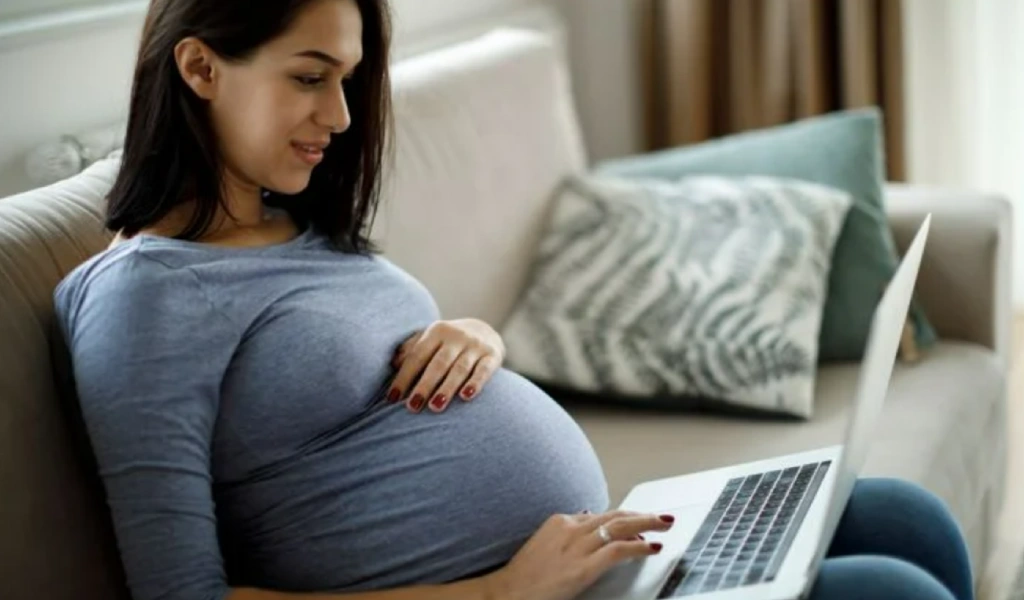Expect more pronounced and intensified symptoms when carrying twins during pregnancy.
At times, you may ponder over the symptoms of having a twin pregnancy. Is it because you notice a larger bump? An ultrasound scan is the most reliable way to verify the number of babies. During pregnancy, the body starts producing new hormones that lead to various adjustments to support the baby’s growth and delivery.
While there is no definitive proof, it is believed that pregnancy hormones might be elevated in twin pregnancies compared to singletons. This can result in early and heightened pregnancy symptoms for many mothers.
Continue reading ‘Top Signs And Symptoms of Twin Pregnancy‘ to learn about the indicators and signs of a twin pregnancy and how to care for your twins in the womb.
What are the factors that can raise the likelihood of having twins during pregnancy?
According to the National Institutes of Health (NIH), twin births represent approximately 3 percent of all live births in the United States. Some potential factors that may increase the likelihood of a twin pregnancy include:
- Assisted Reproductive Techniques (ART) include various fertility treatment methods such as IVF (In vitro fertilization), ZIFT (Zygote intrafallopian transfer), and GIFT (Gamete intrafallopian transfer). These procedures involve transferring multiple embryos into the uterus, which can result in the conception of twins.1
- After women turn 30, their bodies start producing more FSH (follicle-stimulating hormone), which triggers the release of multiple eggs from the ovary. This heightens the chances of having twins.2
- If your height is above normal and your BMI is 30 or more, your likelihood of conceiving twins is higher.
- If you have already given birth to twins, there is a possibility of having twins again.
Studies have indicated that a mother’s age can impact the likelihood of giving birth to twins.3 The information consistently revealed a rise in the probability of having twins as the woman’s age increased. Women between the ages of 40 and 54 had twin birth rates that were twice as high as those of women between 20 and 24.
Early Signs Of Twin Pregnancy
These early indications of pregnancy indicate the possibility of having twins.
- Extreme morning sickness in the first two weeks of pregnancy can be attributed to elevated levels of hCG. Hyperemesis gravidarum, another name for extreme morning sickness, can lead to severe nausea before missing a period.4
- Twin pregnancy often results in feelings of tiredness, fatigue, drowsiness, and lack of energy within two to three weeks of conception. Since you are carrying and nourishing two babies, it is important to get adequate rest and proper nutrition to support your body’s needs.
- When pregnant with twins, your body requires more food to meet the needs of the growing babies, leading to an increased appetite.
- The presence of a twin pregnancy can be easily identified by the size of the belly, which is larger than usual. In cases of twins, the uterus tends to grow more to support the development of two babies.
- Mood swings are a frequent occurrence due to the increased level of hormones produced by the body to support the growth needs of the fetuses. These changes typically become evident around six weeks into the pregnancy.
- The presence of elevated levels of hCG in either blood or urine is indicative of pregnancy. Should the levels exceed the typical range, there may be a possibility of twin pregnancy.
Siana Su, the mother of two adorable twin girls, discusses the difficulties that come with a twin pregnancy. She explains that carrying twins not only means having double the babies but also often leads to experiencing double the pregnancy symptoms. Throughout her pregnancy, she endured morning sickness, food aversions, exhaustion, uterine cramping, backaches, strange dreams, insomnia, mood swings, acne, anemia requiring iron infusions, heartburn, and swelling.
She emphasizes the constant struggle with food aversions and exhaustion, which was so severe that she had to stop working out completely. Even after giving birth, she still experienced food aversions until the day after delivery.
In addition to these, some other indications and symptoms distinguish a twin pregnancy from a typical pregnancy.
Additional Signs And Symptoms Of Twin Pregnancy
Based on the initial indicators, you can determine if you are expecting twins or not. However, there are additional signs that can assist in arriving at a more definitive conclusion.
- Your healthcare provider routinely measures the fundal height, which is the distance from the top of the pubic bone to the top of the uterus. This measurement helps determine the growth stage of the fetus.5 Fundal height correlates with the number of weeks you have been pregnant. If the measurement increases by more than one centimeter per week, it could be a sign of a twin pregnancy.
- During the latter part of the initial three months of pregnancy, medical professionals might perform a Doppler heartbeat count test to identify the fetal heartbeat. In the case of twins, it is possible to hear the beating of two hearts. Nonetheless, the accuracy of the Doppler findings is lower compared to ultrasound because distinguishing between the two heartbeats can be challenging.6
- When you are pregnant with twins, experiencing difficulty breathing early on can be a sign that the two babies are putting pressure on your diaphragm. It is important to seek advice from your doctor if you are feeling discomfort.
- Cramps can indicate a twin pregnancy because the uterus expands more than usual in the early stages.
- During pregnancies with twins, premature labor is frequently observed and necessitates prompt medical intervention.
- Regularly experiencing back pain can be a result of gaining excess weight, an enlarged uterus, and increased hormonal activity. Maintaining good posture by standing tall with your chest held high can aid in relaxation. It is important to wear flat shoes and avoid locking your knees while sitting to prevent further discomfort.
- Frequent urination is a common occurrence during pregnancy, but it becomes more pronounced in cases of twin pregnancy due to the increased pressure on the bladder from the larger uterus. Despite the increased need to urinate, it is crucial to continue drinking plenty of fluids to keep the body hydrated. In addition to these symptoms, other signs of twin pregnancy closely resemble those of a singleton pregnancy.7
- You might have cravings for certain foods and dislike others, as well as feeling nauseated by certain smells.
- Pregnancy with twins necessitates increased blood circulation to ensure the proper growth of the babies. This heightened blood flow can cause varicose veins to develop, typically in the legs. Additionally, the pressure exerted on the uterus by the babies can result in pelvic pressure and the compression of pelvic organs, leading to the expansion of veins near the vagina.
- Early indicators of digestive problems include bloating, constipation, and heartburn. To alleviate these symptoms, it is recommended to steer clear of spicy and greasy foods, stay hydrated, and opt for smaller, more frequent meals.
- Difficulty sleeping, also known as insomnia, can be caused by issues like back pain, cramps, swelling, digestion problems, tiredness, nausea, and vomiting. One effective way for pregnant women carrying twins to get better sleep is by lying on their sides with a pillow supporting their legs and tummy.
- During the fourth and fifth weeks of a twin pregnancy, it is common to experience sore, tender, and painful breasts as a result of hormonal changes. By the sixth week, the aureoles and nipples may darken and become highly sensitive. Using maternity bras can provide relief from the discomfort.8
- Having twins can raise the chances of experiencing postpartum depression, as it may take longer for the mother to adapt to the new routine after giving birth. In contrast to a singleton pregnancy, mothers of twins often feel more fatigued and have to spend extra time feeding both babies.
- Engaging in meditation, practicing relaxation techniques, and maintaining a healthy diet can assist in managing depression. Additionally, seeking guidance from other mothers who have gone through the same experience can provide valuable insights and support.
Does having a larger stomach indicate a twin pregnancy? And if so, should you expect to gain more weight than with a single pregnancy?
How much weight should you gain when you are pregnant with twins?
Based on the mother’s BMI value, below is a table that shows the necessary amount of weight to be gained during pregnancy.
| PRE-PREGNANCY WEIGHT | BODY MASS INDEX BMI | RECOMMENDED WEIGHT GAIN (IN POUNDS) |
|---|---|---|
| Underweight | Less than 18.5 | 28–40 |
| Normal Weight | 18.5–24.9 | 25–35 |
| Overweight | 25–29.9 | 15–25 |
| Obese | 30 and greater | 11–20 |
Can Twin Pregnancy Affect The Babies’ Health?
Twin pregnancies can have an impact on babies. Some health concerns may arise such as:
- Premature birth: Preterm babies require careful monitoring because they have a higher likelihood of health complications, such as problems with their intestines and breathing. Additionally, there is a risk of long-term developmental delays that could impact the child’s ability to reach typical milestones and perform well in school.
- Growth problems in the fetus: Twin pregnancies can result in issues with growth, like one twin being smaller than the other twin, leading to them being known as discordant twins. Towards 30 to 32 weeks, the rate of fetal growth may decrease because the babies require more nutrients and the placenta may struggle to support the growth adequately. This condition, known as IUGR or Intrauterine Growth Restriction, often leads to low birth weights.
- Complications of low birth weight: Infants with a lower birth weight (below five pounds, eight ounces) have a higher probability of experiencing health complications like retinopathy of prematurity and hypertension. Babies with IUGR face an increased likelihood of developing persistent health conditions such as vision and hearing impairments, cerebral palsy, and intellectual disability.
- Birth defects: Twin pregnancies have the potential to result in birth abnormalities in infants, affecting the functioning and physical structure of their bodies. The presence of multiple babies increases the risk of birth defects when compared to just one baby.9
- Twin to Twin Transfusion Syndrome (TTTS) occurs when a single placenta is utilized by both twins with the development of irregular blood vessels. This can lead to unequal blood flow, endangering one of the babies. Laser surgery is an effective method to address TTTS by closing off the abnormal blood vessels connecting the twins. Additionally, the prenatal procedure known as amniocentesis can be used to alleviate TTTS by removing excess amniotic fluid from the uterus.
- Neonatal mortality in twin pregnancies is linked to infants being born prematurely and passing away within the first month of life.10
Some potential complications linked to a twin pregnancy may comprise placenta previa, fetal distress, and vanishing twin syndrome. Furthermore, the pregnancy can present complexities, necessitating readiness to handle any emerging concerns.
Complications of Twin Pregnancy
In a twin pregnancy, as with any normal pregnancy, the possibility of complications cannot be entirely dismissed. Presented below are several potential complications that may arise in the context of a twin pregnancy.
- Early labor pain can be experienced due to uterine contractions that lead to premature cervical dilation. It is possible to also encounter Braxton Hicks contractions; however, it is crucial to acknowledge that not all women undergo this phenomenon, and such contractions are not indicative of imminent labor.11
- The incidence of preeclampsia in twin pregnancies is two to three times greater compared to singleton pregnancies.12 Elevated blood pressure is common among women carrying twins due to increased demands on blood vessels for proper circulation. Preeclampsia typically manifests around the 20th week of gestation, but its impact can be mitigated through adequate prenatal monitoring and care.
- Iron plays a crucial role in facilitating the binding of oxygen molecules to hemoglobin in the blood. A deficiency of iron, coupled with an increased need for oxygen due to various factors, can lead to the development of anemia. In instances of anemia, medical professionals typically recommend the use of iron supplements to address the deficiency.
- Polyhydramnios is a medical condition characterized by an abnormal accumulation of amniotic fluid within the uterus, resulting in abdominal discomfort and respiratory difficulties.
- Gestational diabetes occurs due to an increased size of the placenta, higher hormone levels from the placenta, and increased insulin resistance caused by the placenta. If left untreated, it can present significant dangers for both the mother and the baby. Following dietary adjustments and closely monitoring insulin levels can reduce these risks.
- Intrauterine fetal demise is an uncommon occurrence in which one of the twin fetuses passes away inside the womb. The decision to deliver the deceased fetus through a surgical procedure is made by the doctor.
- Irregular flow of bile in obstetric cholestasis causes an excess buildup of bile salts in the bloodstream. Proper treatment for this disorder includes the use of suitable medications and regular monitoring. To prevent the onset of this condition, it is important to steer clear of fatty foods and alcohol.
There may be additional challenges that resemble those in a sole pregnancy. Your physician should be capable of assisting you with these issues.
How To Deal With Twin Pregnancy Stress?
Here are some simple tips for dealing with the situation. Consult with family and friends for the support you need during this time.
- Speak with other mothers who have twins to gain insight into their experiences and how they handled any challenges they faced. Learning from their experiences may guide you in making informed decisions.
- During a pregnancy with twins, you may experience extreme fatigue. As a result, it’s important to ensure you are getting enough rest and sleep.
- If you are experiencing depression, it is important to consult with your doctor. They can provide recommendations on how to address the issue. Additionally, reaching out to your family for support can be beneficial.
- If you are a woman who is employed, it is important to take maternity leave early on. As you approach childbirth, you may face discomfort, and it is crucial to prioritize rest during this time.
- Eating nutritious meals and engaging in low-impact physical activities like walking can assist in reducing stress levels.
- Expect an early delivery during a twin pregnancy, so it is important to plan and ensure that everything is set up and organized at home.
Being pregnant with twins is an enchanting experience. The joy of finally holding your babies erases all the struggles you faced during pregnancy. It is crucial to prioritize self-care and attend regular health check-ups throughout your pregnancy journey.
Pregnancy is a wonderful time that brings happiness to a family, but having twins can bring even more joy. If you are over 30, undergoing fertility treatments, or have a family history of twins, your chances of having twins are higher.
Look out for specific early signs of twin pregnancy such as severe morning sickness, increased fatigue, mood swings, and elevated levels of hCG in blood or urine tests.
Twin pregnancies come with additional risks and complications, so it is important to rest, take precautions, manage stress, maintain a healthy diet, and attend prenatal appointments as advised.
Key Pointers of ‘Top Signs And Symptoms of Twin Pregnancy’
- Morning sickness may be more intense in twin pregnancies.
- The growth of the uterus is faster and more pronounced in twin pregnancies.
- The body has to exert more effort to support two babies, resulting in increased fatigue.
- Twin pregnancies exhibit elevated levels of the hormone human chorionic gonadotropin (hCG).
- The additional weight from carrying two babies in the abdominal area can lead to back discomfort.




























